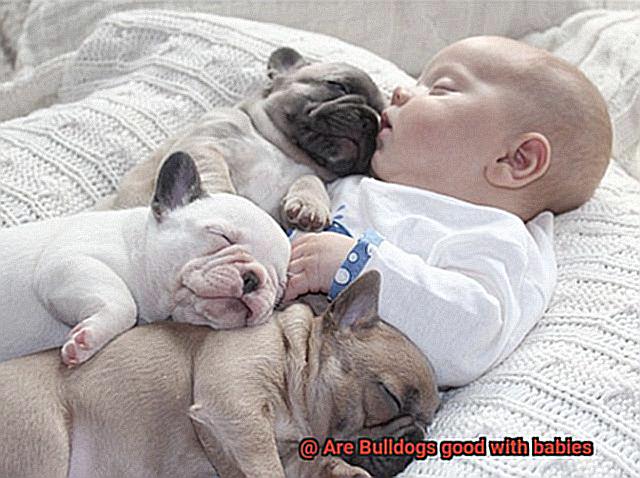Are Bulldogs good with babies?
As soon-to-be parents, we can’t help but wonder if our beloved Bulldogs will be as smitten with our little bundles of joy as we are. Well, get ready to be charmed because Bulldogs and babies just might be the cutest combo ever.
In this blog post, we’re diving headfirst into the world of Bulldogs and their potential for becoming best buds with babies. From their gentle nature to their surprising patience, these squishy-faced pups have earned quite the reputation as excellent companions for little ones. So let’s find out if Bulldogs truly live up to the hype.
Get ready for heartwarming stories, expert advice, and tips on how to introduce your Bulldog to your baby without any hiccups. We’ll debunk myths, tackle potential challenges, and help you decide if a Bulldog is the perfect furry sidekick for your growing family.
So kick back, relax, and prepare yourself for an adorable journey exploring the incredible bond between Bulldogs and babies. It’s time to see if these wrinkly wonders are truly a match made in cuteness heaven.
Understanding the Temperament of Bulldogs
Contents
- 1 Understanding the Temperament of Bulldogs
- 2 Benefits of Having a Bulldog Around Babies
- 3 Socialization and Training for Bulldogs and Babies
- 4 Supervision is Essential for Bulldog-Baby Interactions
- 5 Exercise and Mental Stimulation for Bulldogs
- 6 Monitoring the Bulldog’s Body Language and Behavior Around Babies
- 7 Teaching the Baby How to Interact Appropriately With Dogs
- 8 Conclusion
Are you wondering if your adorable pooch is good with babies? Well, you’re in the right place. Bulldogs are known for their friendly and gentle nature, making them a popular choice for families with little ones. But let’s dive deeper into understanding their temperament and how to ensure safety when interacting with babies.
Each Bulldog is a unique individual, so it’s essential to recognize that their behavior can vary. However, Bulldogs generally have a laid-back and easygoing disposition. Their patience and tolerance are crucial when it comes to interacting with infants and young children. They are affectionate and loving towards their family members, including babies, creating a peaceful and harmonious environment.
Bulldogs are typically not aggressive or overly excitable, which reduces the risk of them accidentally hurting or scaring a baby. However, it’s important to note that supervision is key. Always keep an eye on any interactions between your Bulldog and your bundle of joy to ensure the safety of both.
Proper socialization and training play a significant role in shaping a Bulldog’s behavior around babies. Early exposure to various stimuli, including babies, helps them become comfortable and well-adjusted. Teaching your children how to properly interact with dogs and respect their boundaries is also crucial.
Remember, Bulldogs have protective instincts towards their families, including babies. They often act as watchdogs, alerting you to potential dangers. But let’s not forget about regular exercise and mental stimulation. Keeping your Bulldog active and engaged helps maintain a harmonious relationship with your little one.
Pay attention to your Bulldog’s body language and behavior around babies. Signs of stress or discomfort, like growling or avoiding the baby, should be taken seriously. If any concerns or issues arise, don’t hesitate to consult with a professional dog trainer or behaviorist for guidance.
In conclusion, Bulldogs have the potential to be great companions for babies, thanks to their gentle nature and protective instincts. However, it’s crucial to consider each dog’s individual temperament, provide proper socialization and training, and always supervise interactions. By creating a safe and positive environment, you can foster a loving bond between your Bulldog and your baby.
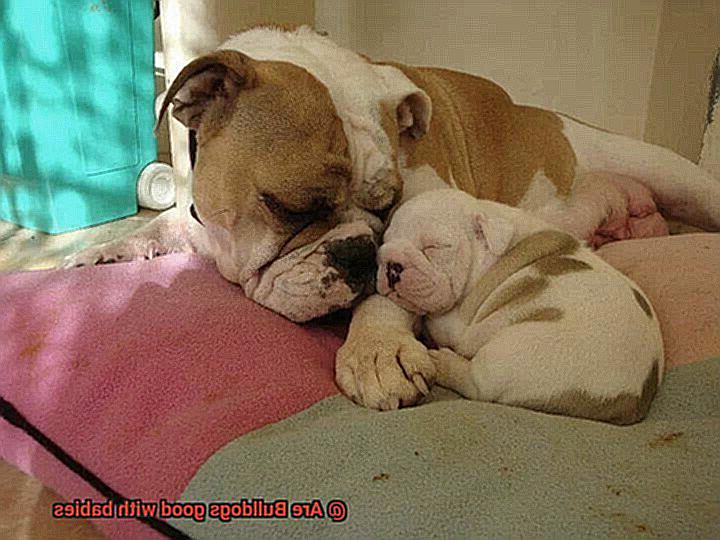
Benefits of Having a Bulldog Around Babies
When it comes to choosing a family dog, Bulldogs are an excellent choice for families with babies. They offer a range of benefits that can enhance the well-being of both the child and the entire family. Here are some advantages of having a Bulldog around babies:
- Gentle and Affectionate Nature: Bulldogs are known for their gentle and affectionate nature. They have a calm demeanor and patient temperament, making them well-suited to be around infants and toddlers. Their loving nature can create a nurturing environment for babies to grow and thrive.
- Protective Guardian: Bulldogs are naturally protective of their families, including babies. They have a strong sense of loyalty and will act as a guardian towards their little human siblings. This provides parents with an added sense of security and peace of mind, knowing that their Bulldog is looking out for their baby’s safety.
- Tolerance for Rough Handling: Babies can unknowingly subject dogs to rough handling, but Bulldogs are generally tolerant of this behavior. They have a high tolerance for pulling, tugging, and accidental bumps from clumsy little hands. This makes them a safe choice for families with young children who are still learning how to interact with animals properly.
- Adaptability: Bulldogs are highly adaptable dogs that can adjust well to the chaos and noise that often comes with having a baby in the house. They can handle the unpredictable nature of a household with children, maintaining their composure and remaining calm in various situations.
- Low Exercise Needs: Bulldogs are not overly energetic dogs, which can be beneficial when it comes to having them around babies. They do not require excessive exercise or constant stimulation, allowing parents to focus on caring for their little ones without worrying about meeting the dog’s exercise needs.
- Bonding and Companionship: Bulldogs have a reputation for being great cuddlers. They love to snuggle up next to their family members, including babies. This can create a bond between the dog and the child, promoting feelings of comfort, security, and companionship for both parties.
- Teaching Responsibility and Empathy: Having a Bulldog around babies can help teach them important life lessons such as responsibility, empathy, and compassion. Children can learn how to care for another living being by participating in simple tasks like feeding the dog or taking them for short walks (with adult supervision).
- Improved Emotional Development and Social Skills: Research has shown that growing up with pets can have numerous benefits for children, including improved emotional development, increased empathy, reduced stress levels, and enhanced social skills. Having a Bulldog as a constant companion during their early years can contribute to these positive effects.
Socialization and Training for Bulldogs and Babies
Bulldogs and babies make an adorable pair, but it’s important to ensure a harmonious relationship between the two. Socialization and training are key factors in creating a safe and positive environment for both Bulldogs and babies.
Here, we will explore the importance of socialization and training when introducing French Bulldogs to babies, providing valuable insights based on first-hand experiences.
The Importance of Socialization:
Socialization is crucial for Bulldogs to develop positive behavior towards babies. By gradually exposing them to the sights, sounds, and smells associated with babies, Bulldogs can become more comfortable around them. Here are some tips for socializing Bulldogs with babies:
- Start slow: Allow Bulldogs to observe babies from a distance, rewarding calm behavior.
- Supervised interactions: Encourage supervised interactions between Bulldogs and babies to foster trust and familiarity.
- Teach respect: Use commands like “gentle” or “leave it” to prevent rough play or accidental harm to the baby.
Positive Reinforcement Training Techniques:
Positive reinforcement training is highly effective in teaching Bulldogs appropriate behavior around babies. Here’s how you can use this technique:
- Reward desired behaviors: Reinforce calm behavior by rewarding Bulldogs with treats or praise.
- Consistency is key: Set clear boundaries and consistently reinforce them to establish a safe relationship.
- Individual temperament: Consider each Bulldog’s unique temperament when assessing compatibility with babies.
Individual Differences:
It’s important to remember that every Bulldog is unique, and their temperament should be taken into consideration when introducing them to babies. While some Bulldogs may naturally have a gentle nature, others may require additional training and socialization efforts.
Conclusion:
Socialization and training are vital in ensuring a positive and safe relationship between Bulldogs and babies. By introducing Bulldogs to babies in a controlled environment, teaching respectful interactions, and using positive reinforcement training techniques, you can create a harmonious bond between the two. Remember to consider each Bulldog’s individual temperament and always prioritize supervision to ensure the safety of both the dog and the baby.
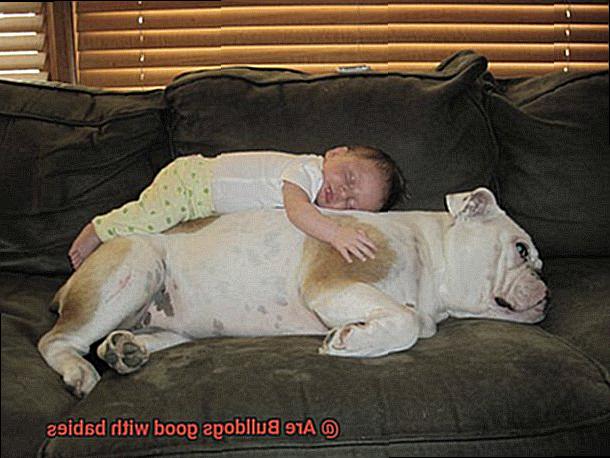
Supervision is Essential for Bulldog-Baby Interactions
They have the potential to be wonderful companions for babies, creating heartwarming bonds that last a lifetime. However, it is crucial to emphasize the importance of supervision when bulldogs and babies interact. In this article, we will explore why supervision is essential, providing you with valuable insights based on research and first-hand experiences.
Safety First:
Babies are delicate and vulnerable, requiring special care and attention. Bulldogs, despite their good intentions, may accidentally cause harm due to their size or exuberance. Having a responsible adult present ensures immediate intervention if any signs of discomfort or aggression are displayed by either the bulldog or the baby.
Teach Appropriate Behavior and Boundaries:
Supervision provides an opportunity to teach both the dog and the child appropriate behavior and boundaries during their interactions. By observing their interactions closely, caregivers can intervene and redirect any undesirable behavior, ensuring a positive experience for both parties involved.
Prevent Accidents and Injuries:
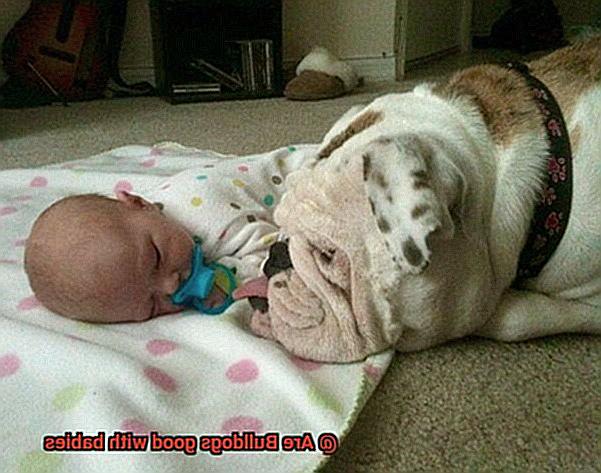
Accidents can happen in a split second, especially when there is a size difference between the bulldog and the baby. Regular supervision allows caregivers to anticipate potential hazards and take preventive measures to avoid accidents or injuries.
Early Detection of Stress or Anxiety:
Bulldogs may experience stress or anxiety in certain situations, just like humans. Babies can also display signs of distress or discomfort during interactions. Supervision enables early detection of these signs, allowing for prompt action to address any concerns and ensure the well-being of both the dog and the baby.
Respect Individual Differences:
Each bulldog has its own unique personality traits and preferences. Some bulldogs may be more tolerant and patient with babies, while others may be less so. Supervision provides an opportunity to assess the specific dynamics between the bulldog and the baby, ensuring that both feel comfortable and safe in each other’s presence.
Ongoing Monitoring:
Behavior can change over time, and as babies grow and develop, their interactions with dogs may change as well. Regular supervision allows for adjustments to be made accordingly, ensuring a harmonious environment for both the bulldog and the baby.
Conclusion:
Supervision is an essential aspect of bulldog-baby interactions. By being vigilant and attentive, caregivers can create a safe and positive environment where both the bulldog and the baby can thrive. Remember to always prioritize safety, teach appropriate behavior, and respect individual differences. With proper supervision, you can foster a heartwarming bond between your bulldog and baby that will last a lifetime.
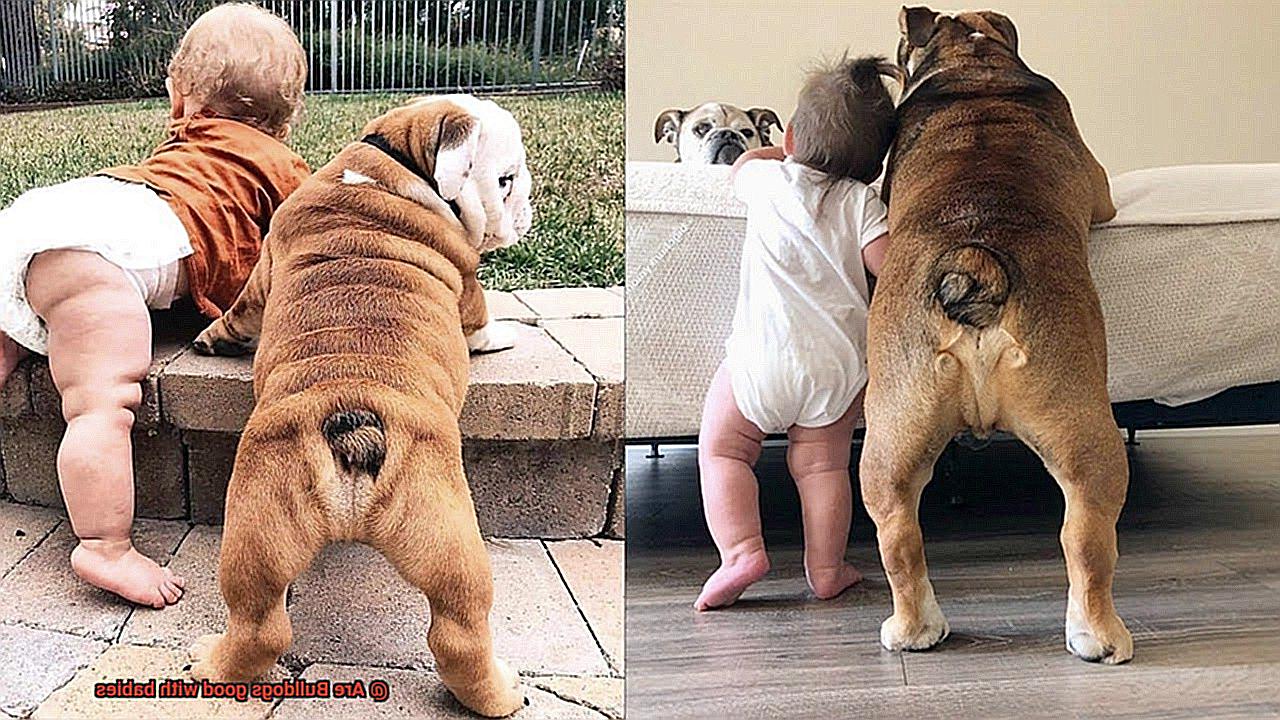
Exercise and Mental Stimulation for Bulldogs
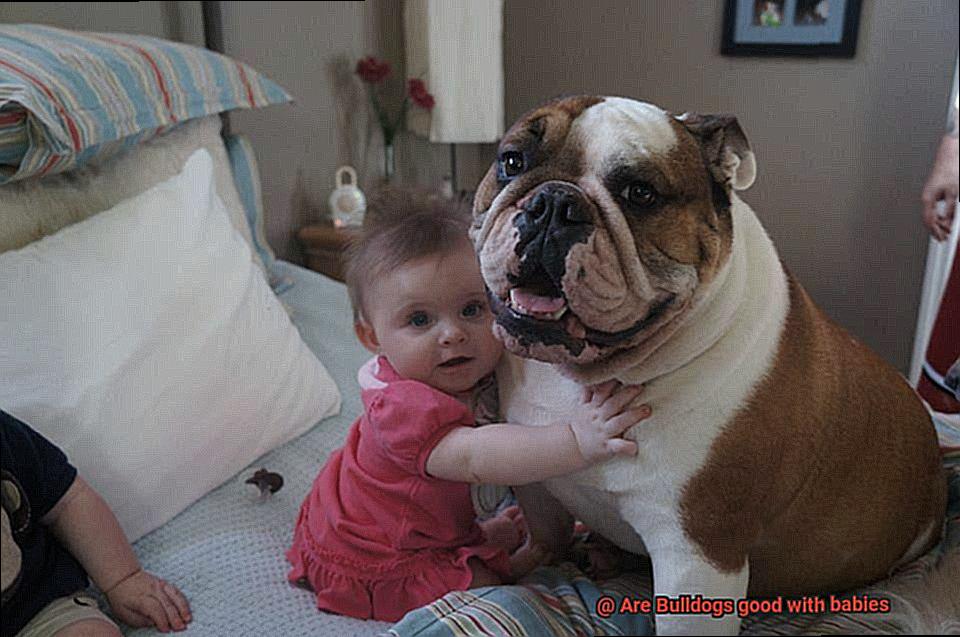
We all know how adorable and lovable these little pups are, but did you know that exercise and mental stimulation are essential for their health and overall well-being? That’s right. In this article, we’ll dive into why exercise and mental stimulation are important for your furry friend, and we’ll give you some tips and tricks to keep them happy and mentally sharp.
Why is exercise important for French Bulldogs?
French Bulldogs may not be the most energetic dogs out there, but they still need their daily dose of exercise. Regular physical activity helps keep them fit, prevents weight gain, and reduces the risk of obesity-related health issues. Plus, it gives them an outlet for their energy and helps prevent destructive behaviors that can arise from boredom.
So, what kind of exercise should you do with your French Bulldog?
- Short walks: Bulldogs love going for walks, but keep them short and sweet. A nice stroll around the block or a nearby park is perfect for them.
- Backyard playtime: Set up a play area in your backyard where your Frenchie can run around and explore. You can even join in on the fun with games like fetch or tug-of-war.
- Indoor games: When the weather isn’t cooperating, bring the fun indoors. Play a game of hide-and-seek or set up an obstacle course using pillows and blankets. Get creative.
Don’t forget about mental stimulation.
French Bulldogs are intelligent little creatures, and they need mental stimulation to keep their minds sharp. Boredom can lead to destructive behaviors, so it’s important to provide them with activities that engage their brains.
- Interactive toys: Invest in some interactive toys or puzzles that require problem-solving skills to get treats or rewards. This will keep your Frenchie entertained for hours.
- Training sessions: French Bulldogs are smart cookies, so why not teach them some new tricks? Regular training sessions not only stimulate their minds but also strengthen the bond between you and your pup.
- Environmental enrichment: Mix things up in their living space. Introduce different textures, scents, and sounds to keep them mentally engaged. Rotate their toys and bring in new ones to keep things interesting.
Remember, safety first.
French Bulldogs are prone to overheating due to their shortened snouts, so it’s crucial to monitor their temperature during exercise, especially in hot weather. Always provide fresh water and shade during outdoor activities, and consider exercising them during cooler times of the day.
In conclusion, exercise and mental stimulation are vital for your French Bulldog’s well-being. Regular physical activity keeps them fit and prevents obesity-related health issues, while mental stimulation prevents boredom and destructive behaviors. So, get out there and have some fun with your furry friend.
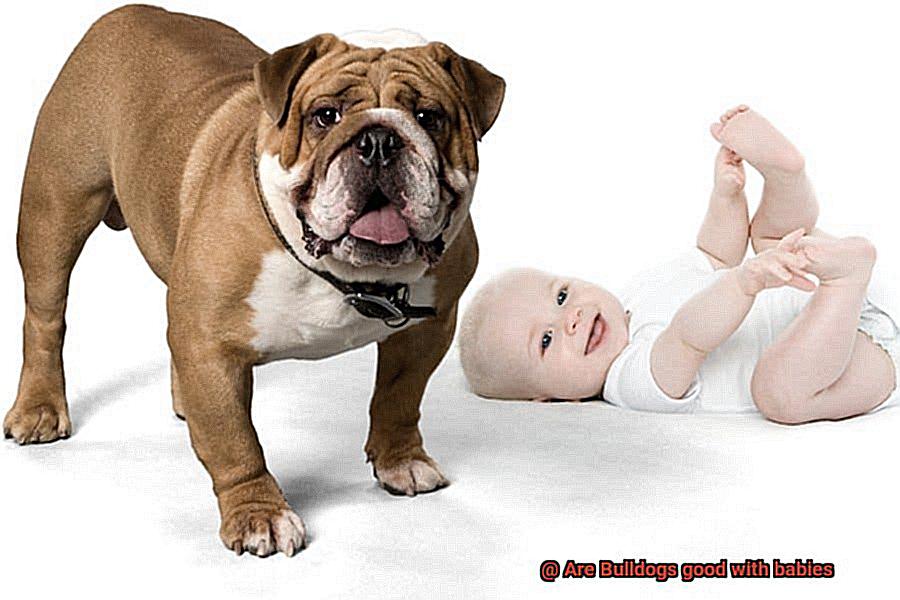
Monitoring the Bulldog’s Body Language and Behavior Around Babies
Understanding the body language and behavior of your French Bulldog around babies is crucial to ensure a safe and harmonious environment for both your furry friend and your little one. By closely monitoring their interactions, you can address any potential issues and create a positive relationship between them. Here are some tips to help you navigate this important aspect:
Body Language Cues:
- Positive signs: Relaxed body posture, wagging tail, soft eyes.
- Stress or discomfort signs: Stiff body posture, tense facial expression, raised hackles, tightly tucked tail.
Gradual Introduction:
- Introduce your bulldog to the baby gradually and under controlled circumstances.
- Start with short supervised interactions to allow both parties to get used to each other’s presence.
Assessing Behavior:
- Observe how your bulldog responds to the baby.
- Seek professional guidance if your bulldog shows signs of aggression or excessive excitability.
Establishing Boundaries:
- Teach your bulldog to respect the baby’s personal space.
- Encourage gentle and calm behavior by rewarding appropriate behavior around the baby.
Supervision is Key:
- Always supervise interactions between your bulldog and baby, especially during their initial stages of interaction.
- Never leave them alone unsupervised to prevent accidents or misunderstandings.
By closely monitoring your bulldog’s body language and behavior around babies, you can ensure a safe and nurturing environment for both of them. Remember to observe their cues, introduce them gradually, establish boundaries, and always supervise their interactions. This will help foster a positive relationship between your bulldog and baby, ensuring their safety and well-being.
Teaching the Baby How to Interact Appropriately With Dogs
These adorable pups can bring so much joy to a household, but it’s crucial to ensure that both baby and dog are safe and happy during their interactions. So, let’s get started.
- Set Boundaries: The first step is teaching your baby not to approach the dog aggressively or invade its personal space. You want to encourage gentle gestures and demonstrate how to pet the dog gently using slow and calm movements.
- No Pulling, Please: It’s important to teach your baby to avoid pulling on the dog’s ears or tail. This can cause discomfort or even pain for our furry friends.
- Supervise Closely: Always keep a watchful eye on any interactions between your baby and the French Bulldog, especially in the beginning. This will allow you to intervene if any inappropriate behavior occurs.
- Respect Their Space: Teach your baby not to disturb a sleeping or eating dog. Just like humans, dogs need their rest and meals without interruption.
- Be Gentle With Their Belongings: Encourage your baby to be respectful towards the French Bulldog’s belongings, such as toys or food bowls. Taking things away forcefully can create tension and potential conflicts.
- Recognize Signs of Discomfort: Teach your baby to recognize signs of fear or stress in the dog, such as growling, excessive barking, or trying to move away. This will help them understand when it’s best to give the pup some space.
- Safety First: If your French Bulldog displays any signs of aggression or discomfort, it’s crucial to remove the baby from the situation immediately and seek professional guidance. Safety is our top priority.
- Consistency is Key: Remember, consistency is key when teaching your baby how to interact with French Bulldogs. Reinforce positive behaviors and gently redirect any inappropriate actions.
By following these tips, you can create a positive and safe environment for both your baby and your French Bulldog. It’s never too early to start teaching appropriate interactions and fostering a loving bond between them. Remember, patience and understanding go a long way.
If you want to dive deeper into this topic, check out “Creating a Safe Haven: Decoding Bulldog Body Language for Harmonious Baby-Bulldog Interactions.” This resource will provide you with valuable insights on reading your French Bulldog’s body language and behavior around babies.
_OtZxsT_kTs” >
Conclusion
In conclusion, Bulldogs are excellent companions for babies.
Their gentle and patient nature make them a great choice for families with young children. With their sturdy build and protective instincts, Bulldogs can provide a sense of security and comfort to both parents and infants.
Whether it’s cuddling on the couch or playing in the backyard, Bulldogs are always ready to engage with little ones in a safe and nurturing way.
